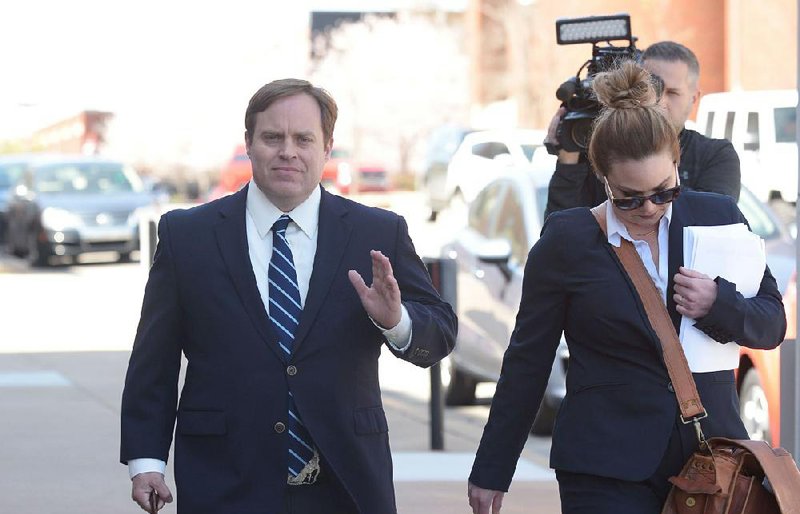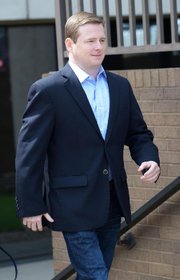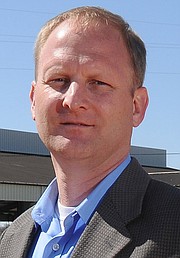FAYETTEVILLE — The lead FBI investigator is under investigation and may never testify in the trial.
Defense attorneys have accused the judge of bias and a conflict of interest.
The judge has chastised the defense for “locker room” language and for publicizing secret documents.
Then one of the three co-defendants pleaded guilty and became a government witness less than a week before the trial date.
Welcome to the trial of former state Sen. Jon Woods, who is accused of taking bribes — but only after a defense motion objecting to using either that word or “kickbacks” was denied.
The rancor of pre-trial motions and hearings will not follow this case into trial, U.S. District Judge Timothy L. Brooks told all sides last month. Trial began Monday with a full day in the jury selection process. A jury of six men and six women with two woman alternates was finished by mid-day Tuesday, with opening statements coming Tuesday afternoon.
The first witness is expected to testify today in the trial of Woods and his remaining co-defendant at the federal courthouse in Fayetteville. The judge warned prospective jurors the trial is expected to take three weeks and could last four.
The case was originally set for trial May 8 of last year. More than 300 motions, counter-motions, court orders, memorandum and replies fill the case file. Much of the record is still sealed pursuant to a March 27, 2017, court order.
The potential witness list holds 160 names, including state officials and current and former legislator — many of whom were unaware they were potential witnesses until their names were shown to the jury Monday.
“The docket in this case is far more lengthy and tortured than those of typical criminal cases in this court,” Brooks wrote in a March 2 court order in the case. “The last seven months of these proceedings have had very little to do with the substance of the government’s charges against the defendants. Instead, this case has become consumed with numerous heated accusations of governmental misconduct.
“Tomorrow this case returns to being about the 17 charges that the government has brought against these defendants,” Brooks’ order said.
THE CASE ITSELF
“This case is about the betrayal of the people of Arkansas by this defendant, Jon Woods,” Assistant U.S. Attorney Kenneth Elser said in his opening statement Tuesday afternoon.
Woods of Springdale; Oren Paris III, former president of Ecclesia College in Springdale; and consultant Randell G. Shelton Jr., of Kemp, Texas, were indicted in March 2017 by a grand jury for participating in a kickback scheme. Woods is accused of taking kickbacks from Paris in return for directing $550,000 in state General Improvement Fund grants to Ecclesia, all in 2013 or 2014.
Paris disguised the kickbacks as consulting fees paid to Shelton’s company, Paradigm Strategic Consulting, according to Elser. Shelton then passed money along, the government contends. Els-er called Paradigm “a bogus company” only incorporated the day Paris sent a $50,000 check from the college after receiving the first state grant from Woods.
Four days later, Shelton wire-transferred $40,000 of the $50,000 to Woods, Elser told the jury. Woods’ bank account was overdrawn until that transfer, Elser said.
Paradigm was “anything but a bogus company,” said defense attorney Shelly Koehler of Fayetteville. Shelton has a long history of successful enterprises including fundraising that extends to before he entered college, she told jurors. He was helping Ecclesia pursue an $18 million expansion plan and had a good start on major donations to the school before news broke that the state grants were under investigation, devastating the project.
The $40,000 to Woods was a loan to a friend, Koehler said. Woods had amassed a series of debts, she said.
Former state Rep. Micah Neal pleaded guilty to also receiving kickbacks from Paris and is expected to testify in the trial. Neal pleaded guilty Jan. 4, 2017, to one count of conspiracy. His sentence is pending.
Woods faces 15 counts of fraud, all relating to either wire or mail transfers of money. Paris and Shelton were named in 14 of the fraud charges. All three were charged with one count of conspiracy to commit fraud. Woods is also charged with one count of money laundering in connection with the purchase of a cashier’s check.
In all, Woods either steered or convinced other lawmakers to steer $621,500 of improvement fund grants to Ecclesia, according to Elser’s summary of the case on Tuesday. During the same time as the grants were coming in, $267,420 was paid by Ecclesia to Paradigm, Elser said. Of that, $210,420 was removed by Shelton in large cash withdrawals and the $40,000 wire-transferred to Woods, with another $9,235 taken out by automatic teller machine withdrawals.
Woods could do nothing as a state senator by himself, his defense attorney told jurors. Woods’ attorney Patrick Benca of Little Rock told the jury other colleges and universities hire lobbyists and consultants to draw millions in state grants. Every step of the improvement fund grant process is subject to either the approval of other lawmakers, the review of attorneys or regional board approval, Benca said in his opening statement.
Paris pleaded guilty April 4 to one count of fraud. Even that plea was conditional. The U.S. attorney’s office allowed Paris to pursue his appeal that the case should have been dismissed after misconduct by the FBI was discovered. If Paris wins that appeal, his plea and conviction will be erased.
Testimony will show Paris was under intense pressure to plead guilty, Benca told jurors.
Paris’ turn was a major setback to the defense, according to a local criminal defense attorney who practices in federal court.
“It is devastating to your case when a co-defendant goes from being on the same side to cooperating with the government,” said Kimberly R. Weber, a former assistant U.S. attorney in the western district of Missouri who’s now a defense attorney based in Rogers. Weber was with the U.S. Justice Department from 2003 to 2008 and has practiced in Northwest Arkansas since. Before working for the federal government in Missouri, she was an assistant prosecutor in Arkansas for 10 years. She isn’t representing any clients in the Woods case, she said.
Brooks denied a defense motion to delay the trial in a pre-trial hearing after Paris’ guilty plea later in the day April 4.
SECRET RECORDINGS
The “lengthy and tortured” tale of this court case begins as federal investigators closed in on Neal and Woods in late 2015 and early 2016. Neal decided to cooperate with the investigation. He then extended the government more cooperation than it asked for.
Neal offered to wear a wire. Investigators declined, according to Shane Wilkerson of Bentonville, Neal’s attorney. Neal then decided to secretly record conversations on his own that might be of interest to the government. His goal, Neal said in testimony on Jan. 26, was to help investigators and hopefully lighten his sentence.
Neal used an audio recorder disguised as a writing pen to tape conversations from March to October of 2016. He downloaded the audio to a computer at Wilkinson’s office.
The government contends the recordings were made without its supervision or approval. The defense disputes the claim, noting text messages by Wilkinson to the lead investigator on the case, FBI special agent Robert Cessario.
Cessario copied the files, which Wilkinson’s office put in a Dropbox file-sharing website. Woods told Neal the entire theory of his defense in one of those recordings, Ben-ca noted in a Jan. 9 motion. Woods claims the money Shelton paid him was a loan, not a kickback, that motion stated.
The copies of the audio Cessario made went to defense attorneys, who compared the files they had with the texts Wilkinson sent Cessario about them and noted some of the conversations Wilkinson texted about were missing.
In all, later investigation found Cessario had copied and provided 39 of Neal’s 119 audio files. The resulting imbroglio delayed the start of the trial from Dec. 4 to Monday.
The U.S. attorney’s office ordered Cessario to turn in the FBI laptop computer he used to download the files to try and sort out what had happened. Cessario instead took the device to a Benton-ville computer shop Dec. 4 and had the hard drive wiped, according to pre-trial testimony, including Cessario’s. Then he erased it again himself Dec. 7 before taking it to FBI state headquarters in Little Rock. When asked why at a Jan. 25 court hearing, Cessario said he used the computer to download personal medical records he didn’t want disclosed.
Both Brooks and the U.S. attorney’s office found Cessario’s reasoning for wiping the hard drive unbelievable.
“No, your honor,” Assistant U.S. Attorney Aaron Jennen replied when Brooks asked him in a Feb. 15 hearing if Cessario’s reasoning sounded credible. “That reason sounds like burning down a house because you don’t like the drapes.”
Further complicating matters, the computer at Wilkinson’s law office that kept copies from Neal’s pen-recorder malfunctioned on Dec. 27, 2017, and was replaced. The hard drive from the replaced computer was erased.
Whether Cessario’s actions come up at Woods’ trial is an unresolved matter. Brooks barred Cessario from testifying for the prosecution as the details of the computer wipe became public. On April 3, Brooks conditionally denied a defense motion to use Cessario as a witness. However, Brooks said testimony in Woods case could open the door if Cessario’s testimony is needed by the defense, for instance, to rebut testimony by Neal.
“As a defense attorney, I would do everything in my power to make sure it did” come up at trial, Weber said of the Cessario matter. Jury knowledge of the agent’s actions would be very favorable to the defense, she said. “I have practiced in federal court since 2003, and I have never seen a situation like this where an FBI official did such a thing,” she said.
Brooks ruled Cessario s actions are serious, but a separate legal matter under a new investigation.
Brooks’ ruling is in line with federal law, which is “incredibly disfavorable to the defense as far as dismissing a case” because of investigator misconduct, said Brian Gallini. Gallini is senior associate dean for research and faculty development at the University of Arkansas School of Law. Defense attorneys must go beyond proving misconduct, which the government admits in this case, he said. The defense has to prove malicious intent against the defendants. As written, the law requires the defense to show the evidence destroyed would have helped the client’s case.
DEFENSE VS. THE JUDGE
Cessario’s actions became public when Gregory Payne, a defense attorney who represents Paris, released a letter in a Dec. 18 court filing in which the U.S. attorney’s office revealed what Cessario had done.
The letter was protected by a court-ordered seal, Brooks ruled the next morning. Payne disagreed, but should have taken the matter to Brooks before making the letter public, he told the judge in a Feb. 15 court order on whether Payne should be punished. Brooks admonished Payne from the bench and dropped the matter.
The defense has raised Brooks’ own relationship with his former law partner as an issue, court records show. That partner, W.H. Taylor of Fayetteville, represented Woods in 2015 and early 2016 while he was cooperating with the government. Brooks ruled his business relationship with Taylor ended with his appointment as judge on March 7, 2014.
“There is a reason federal judges are appointed for life,” said David Matthews of Lowell, a former state representative and long-time attorney at the same law firm as Weber. “It insulates them from things that could sway them,” such as past business relationships or hopes of future ones, Matthews said. They also don’t need outside resources in the legal community.
“Federal judges don’t have the volume of cases state judges do,” he said. “They have case coordinators and other resources other judges don’t. Law clerks for federal judges, for instance, are skilled attorneys in their own right.”
Woods met with investigators and gave information at least twice, once each in the November and December of 2015. Woods fired Taylor in March 2016, hired Benca and stopped cooperating.
Taylor represented Cessario in the agent’s divorce case that concluded Aug. 15, 2015. Taylor took Woods’ case that October. The defense argued that was a conflict of interest. Brooks ruled otherwise.
BROOKS AND BENCA
Benca’s behavior in court “simply put, is wildly inappropriate and among the rudest that any attorney has ever exhibited before me during my time on the bench” Brooks said in his March 2 order.
“On the record, and with no apology or apparent remorse, counsel for Mr. Woods has used profanity, employed vulgar euphemisms and interrupted the court so many times that I have been compelled to threaten him with sanctions if he would not stop.”
Benca told Brooks in the pre-trial hearing April 4 his behavior was being shown in a half light. He noted in a recent motion Brooks has called his arguments at hearings “disingenuous” or insincere at least six times. Brooks has also used the term “hysterical,” Benca noted.
Brooks warned Benca in a Nov. 30 hearing his request for a delay in the trial at that time looked more like a manipulative strategy than a legitimate request.
“The record is replete of instances where representations made by the government were disingenuous, inaccurate or untrue,” Benca’s Jan. 9 motion says. “Yet it’s Woods, his counsel and co-defendant’s counsel that are being found by this court to be ‘disingenuous’ in it’s request and ‘hysterical’ in his motion practice.”
“It has become clear that the defendants are being held to a different standard than the government.”
Brooks responded, extending a warning to all attorneys in the case his patience for undignified behavior is gone.
“The courthouse is not a locker room,” Brooks warned in the March 2 order. He expressed determination to bring the curtain down on the case’s most flamboyant aspects.
“Regardless of whatever indulgence the court has shown so far, I am firmly resolved that this trial will not be a circus,” his March 2 order says. “The parties in this case have far too much at stake for such nonsense.”
Whatever happens, the trial will share at least one aspect with a circus: The show must go on.
Doug Thompson can be reached by email at dthompson@nwadg. com or on Twitter @NWADoug.




